Can Pet Birds Eat Radishes? A Guide to Avian Nutrition
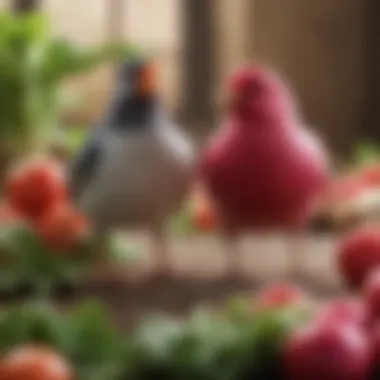
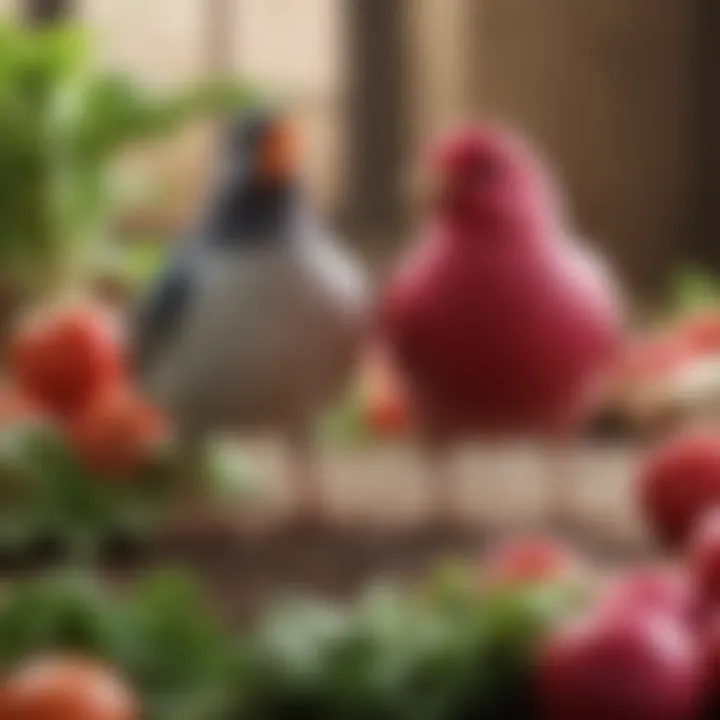
Intro
When it comes to pet birds, the subject of diet often raises a multitude of questions. One of the more intriguing inquiries is about the role of vegetables in their meals. Among these vegetables, radishes have caught the attention of many bird owners. Can these crunchy, peppery root vegetables serve as a tasty treat for our feathered friends? In this article, we will examine the nutritional value of radishes, the dietary needs of various avian species, and the best practices for incorporating new foods into their meals.
Understanding avian nutrition is not just a luxury; it is a vital aspect of ensuring the health and well-being of pet birds. Each species possesses unique dietary needs, and what works for one may not be suitable for another. Therefore, digging deeper into what makes up a balanced diet for birds is crucial.
As we navigate this topic, we will uncover the benefits and precautions associated with feeding radishes to birds. By the end of the article, you will not only know if radishes can be included in your bird’s diet but also how to introduce them safely. Let's take a closer look into the world of avian care, starting with the basics.
Intro to Avian Nutrition
Understanding avian nutrition is critical for anyone who is so much as thinking about keeping pet birds. Nutrition plays a key role in the overall well-being of these feathered companions. Just like we need a balanced diet to thrive, our birds require a harmonious blend of nutrients to keep their spirits chirpy and energy levels high. In fact, providing proper nutrition can mean the difference between a vibrant, healthy bird and one prone to various health issues.
The primary elements influencing bird nutrition revolve around their natural dietary habits. Many birds are seed eaters, but their diets can also include fruits, vegetables, and even insects. The complexity of their dietary needs is vast, considering their size and species may differ drastically. For example, a budgie's needs may not line up perfectly with those of a parrot. Without understanding these unique requirements, bird owners might find themselves making mistakes that could lead to malnutrition or adverse health effects.
Moreover, recognizing the benefits of a well-rounded diet cannot be overstated. Birds that receive proper nutrition showcase brighter plumage, exhibit more playful behavior, and maintain better overall health. In this way, knowledge regarding avian nutrition not only enhances the life quality of the bird but also enriches the bond between bird and owner. As we dive deeper into the specifics of avian nutrition, it is essential to grasp the notion that food is not just a matter of sustenance; it is a foundation for a flourishing life.
Importance of Proper Nutrition
Proper nutrition serves as a cornerstone in ensuring the health and longevity of pet birds. Just imagine if you would live off nothing but junk food—it's not a stretch to say that your health would deteriorate over time. Similarly, for birds, a poor diet can lead to a plethora of health issues, ranging from feather plucking to immune deficiencies. The benefits of a balanced diet extend far beyond mere survival; they enhance the quality of life.
Furthermore, understanding the dietary needs of our feathered friends can also shed light on specific ingredient choices that may seem innocuous but could, in fact, be problematic. For instance, foods high in fat should be served sparingly, as excessive fat can lead to obesity in birds, which is often accompanied by other serious health conditions.
In short, ensuring that birds receive a variety of nutrients not only contributes to a healthy body but can also support mental stimulation and emotional well-being. This makes every bite count, giving pet owners every reason to educate themselves on what's suitable and beneficial for their avian friends.
Basic Dietary Needs of Pet Birds
A pet bird's basic dietary needs boil down to several key categories that include proteins, carbohydrates, fats, vitamins, and minerals. While pet birds often develop preferences that can lead their owners to be indulgent, it’s crucial to maintain a balanced approach.
1. Proteins
These are vital for muscle development and tissue repair. Sources rich in protein for birds include cooked eggs, beans, or commercially prepared pellets. These options provide necessary amino acids that support the bird’s metabolic functions.
2. Carbohydrates
This group is essential for energy. While grains and some fruits can offer the needed carbs, moderation is key to prevent excessive sugar intake.
3. Fats
Fats should come predominantly from healthy sources like seeds and nuts but should be introduced carefully. Too many fats can lead to obesity, and no one wants a chubby bird.
4. Vitamins and Minerals
These micronutrients are pivotal. They help maintain bone health, boost the immune system, and ensure other bodily functions work smoothly. Fresh fruits and vegetables are perfect sources of these essential nutrients.
Consider leafy greens like kale, spinach, and, of course, radishes—though these should be introduced with care, as with any new food item.
By acknowledging and catering to these basic dietary needs, bird owners can significantly enhance their pet's health and happiness, paving the path for a life full of song and activity.
Overview of Radishes
When it comes to the diverse diets of pet birds, the inclusion of vegetables often stirs both curiosity and caution. Radishes, with their crisp texture and vibrant colors, represent an intriguing option. Here, we explore the significance of radishes in avian diets, focusing on their various types, nutritional content, and potential benefits for birds.
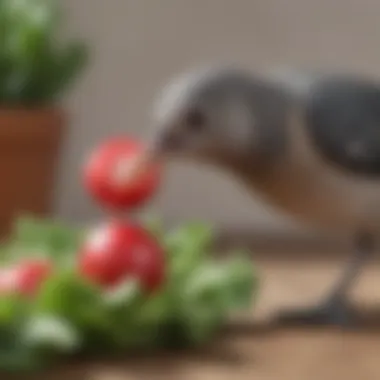
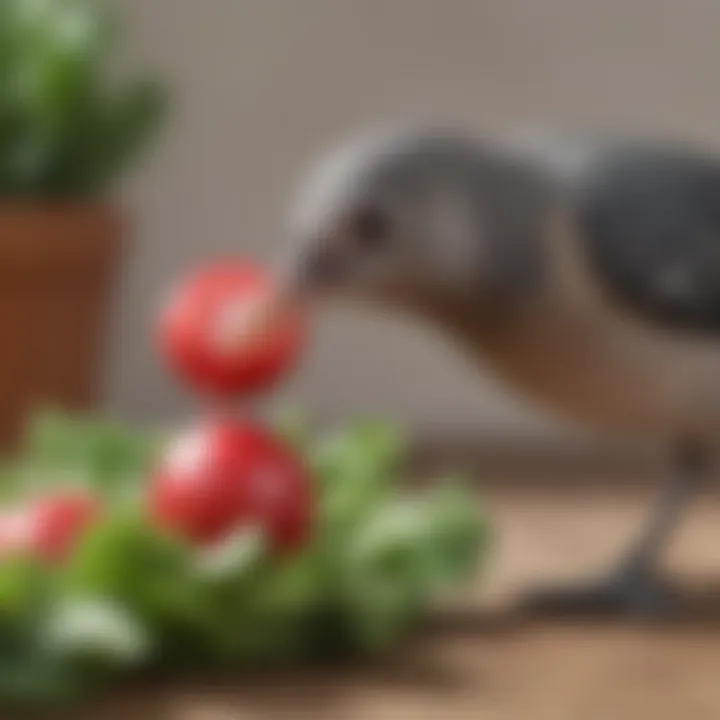
Types of Radishes
Radishes come in several varieties, each offering different flavors and textures. Common types include:
- Red Radishes: The classic variety known for its sharp taste and bright red exterior. These are often found in salads, adding both flavor and crunch.
- Daikon Radishes: Larger and less pungent than red radishes, these white beauties are popular in Asian cuisine and can be a softer option for birds.
- Black Radishes: With a more robust and slightly spicy flavor, black radishes offer a different taste profile that a bird might find interesting.
- Yellow Radishes: These are less common but can be sweeter, providing an additional variety to a bird's palate.
Each type of radish brings its distinct attributes to the table, making them a varied and engaging choice for pet birds.
Nutritional Composition
The nutritional composition of radishes presents a mix of elements that can greatly benefit pet birds. Exploring the components shows how they can contribute to the overall health of avian companions.
Vitamins
Radishes are a source of several essential vitamins. Notably, they contain Vitamin C, known for its role in boosting the immune system. What sets Vitamin C apart is that it's a powerful antioxidant, helping to fend off oxidative stress. For birds, a strong immune system means better defenses against illness. Moreover, Vitamin B6, also present in radishes, helps in processing proteins and supports normal brain development and function. Encouraging intake of these vitamins can lead to a healthier and more vibrant bird.
Minerals
Minerals found in radishes, such as potassium and calcium, are crucial for maintaining avian health. Potassium aids in heart function and muscle contractions, while calcium is vital for strong bones and eggshell formation in breeding females. The unique property of radishes is that they provide these minerals in a natural, easily digestible form, which is beneficial compared to processed dietary options that may not be as readily absorbed. Ensuring that pet birds receive necessary minerals can foster better growth and reproductive health.
Fiber Content
Fiber is another significant aspect of radishes' nutritional profile. This component is essential for digestive health, helping to keep the digestive system running smoothly. Birds, especially those with distinct dietary needs, can benefit from the fiber found in radishes, which aids in preventing digestive disorders such as crop stasis. The unique feature of dietary fiber in radishes is that it comes with a moist texture, making it easy for birds to consume.
Overall, the inclusion of radishes—when served properly—can enrich the diets of pet birds, providing various nutrients that promote overall health. However, as with all new foods, moderation and gradual introduction is key to finding out how well your feathered friend takes to this crunchy vegetable.
Can Pet Birds Safely Eat Radishes?
Understanding whether pet birds can safely eat radishes is crucial for any bird owner who wants to diversify their pet's diet. Radishes may not be at the top of every bird owner’s shopping list, yet they present certain nutritional benefits that can enhance an avian diet. Throughout this section, we will address the positive findings from research as well as potential risks associated with feeding radishes to pet birds. Discerning these aspects helps ensure our feathered friends lead a healthy, well-balanced lifestyle.
Affirmative Research Findings
Several studies show that radishes can be beneficial for birds, rich in necessary nutrients while being low in calories. These crunchy root vegetables are composed primarily of water, which is excellent for keeping a bird hydrated, especially during hot weather.
Additionally, radishes are high in vitamins, such as Vitamin C, which can bolster the immune system of birds. This vitamin is known for its role in enhancing overall well-being. Furthermore, they are a source of antioxidants, and these compounds can aid in combating oxidative stress within avian bodies. Incorporating radial roots might not just add variety but also contribute to a bird’s vitality over the long haul. While there are still questions about the balance of certain components in radishes, the positive findings can’t be ignored.
Potential Risks and Considerations
While the benefits are promising, it's vital to tread warily regarding radishes in a pet bird's diet. Just because something is nutritious doesn’t mean it's always safe. Understanding the potential downsides is equally important as recognizing their advantages.
Oxalates and Digestive Health
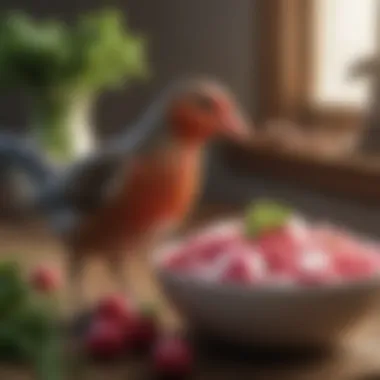

One of the primary concerns around feeding radishes to birds is the presence of oxalates. These naturally occurring compounds can bind with calcium in the digestive tract. High levels of oxalates may lead to issues related to calcium absorption, which is crucial for birds, particularly for their bones and overall metabolism.
Birds with already compromised health or those lacking in essential minerals should be watched clearly. It's not that radishes are a forbidden fruit; rather, moderation is key. When introducing radishes, mixing small amounts with other calcium-rich foods can help mitigate any negative effects that might stem from oxalate consumption.
Allergic Reactions
Another area to consider is the possibility of allergic reactions. Just as with humans, birds can have allergies to certain foods, and radishes are no exception. Some birds may exhibit sensitivity, resulting in gastrointestinal upset or even dermatological issues.
Introducing radishes should be a gradual process, observing any abnormal behaviors or physical changes in the pet bird. The unique attribute here is that while radishes provide nutritional value, their introduction poses a risk of allergic responses that can lead to distressing health problems. Therefore, keen observation by the bird owner during the initial feeding phases is essential.
Addressing the balance between benefits and risks surrounding radish consumption makes sure that pet bird owners are well-informed. This leads to healthier birds that are not only well-fed but also safeguarded from harm.
Feeding Practices for Pet Birds
Feeding practices for pet birds are a crucial aspect of their overall health and well-being. A bird's diet can significantly impact its longevity, energy levels, and even its mood. By understanding how to introduce new foods and achieve a balanced diet, bird owners can ensure that their feathered friends thrive. This section delves into these fundamental practices, highlighting what to keep in mind for optimal feeding.
Introducing New Foods
Introducing new foods to a bird's diet can be a delicate dance. Birds can be quite finicky eaters. This means that presenting new options can sometimes be met with reluctance or hesitation. However, altering and enriching their diet is necessary for their health.
A slow approach can work wonders. Start by cutting up radishes or other veggies into small, manageable pieces and mixing them in with their favorite foods. Observe what catches their attention. Birds often mimic behaviors of their companions, so you might notice them trying something new if they see others enjoying it.
• Gradual Introduction: Introduce one food at a time to monitor reactions. • Appeal: Make the presentation colorful and varied; birds are visual creatures. • Consistency: Keep offering the new food even if initially rejected.
By being patient and mindful about how new foods are presented, you can guide your pet birds toward a wider and healthier selection of choices. Remember, their diet should be a well-balanced spectrum of nutrients, flavors, and textures.
Balancing a Bird's Diet
A balanced diet for pet birds is not merely a straightforward concoction of seeds. It’s about integrating various food types that fulfill their nutritional needs. Achieving this balance is essential to ensure birds receive a full range of vitamins and minerals.
Variety in Vegetables and Fruits
Offering a variety in vegetables and fruits is a hallmark of a well-rounded diet. Each type of vegetable or fruit brings its own unique set of nutrients. For instance, while radishes supply vitamin C, leafy greens offer calcium and other vital minerals.
- Key Characteristic: A diverse group of vegetables and fruits ensures that birds get different nutrients.
- Beneficial Choice: It encourages curiosity and prevents boredom with their meals.
One unique feature of variety is that it can cater to specific dietary needs or health issues. For a bird that's slightly overweight, incorporating low-calorie options can manage their weight.
Some benefits include:
- Enhanced palate
- Better nutrient absorption
- Increased enthusiasm for meals
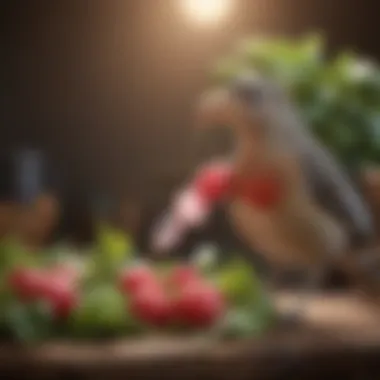
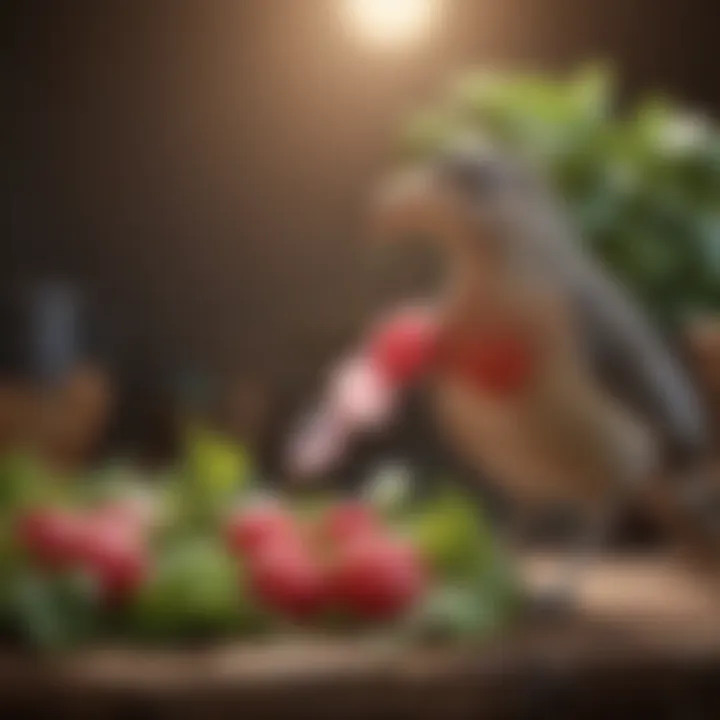
On the downside, the larger variety also requires more knowledge from the owner about which foods are safe and which should be avoided. Therefore, ongoing education is essential in this respect.
Integration of Pellets and Seeds
The integration of pellets and seeds into a bird's diet is another critical aspect that cannot be ignored. Pellets are often fortified with essential vitamins and are designed to be nutritionally complete. Seeds, while loved by many birds, often do not provide all the necessary nutrients on their own.
- Key Characteristic: Pellets offer a standardized nutrition base.
- Beneficial Choice: They can complement seeds while preventing overdependence on them.
What's unique about this integration is how it can foster healthier eating habits with persistent patience from the bird owner. Many birds will instinctively pick out their favorite seeds if placed alongside pellets, promoting a more thoughtful approach to eating.
However, an overreliance on seeds can lead to malnutrition, which is detrimental in the long run. Therefore, a careful blending of both can support a healthier lifestyle for pet birds, ensuring they get the omega fatty acids from seeds while also receiving the complete nutrition provided by pellets.
Practical Tips for Bird Owners
Understanding how to care for pet birds goes beyond simply providing food and water. It's about creating a healthy environment that promotes overall well-being. In the context of introducing new foods, like radishes, bird owners need practical strategies that ensure their feathered companions thrive. Adopting careful feeding practices not only enriches a bird's diet but also helps in preventing potential health issues. Here’s a detailed look at some essential considerations for bird owners.
Monitoring Bird's Reactions
When introducing radishes or any new food, it's vital to keep a close eye on your bird's reactions. Birds can be sensitive creatures, and what works for one may not work for another.
- Observe Behavior: After offering radishes, watch for changes in behavior. Is the bird curious and pecking at the food, or is it turning away?
- Check for Allergies: Some pet birds may develop allergic reactions. Symptoms can range from a slight change in voice to more alarming signs like feather plucking or changes in droppings.
- Monitor Digestion: After eating radishes, observe your bird’s droppings. Healthy droppings are a sign of good health, while changes, such as watery feces, could indicate that the new food isn’t settling well.
Documenting these reactions in a journal can provide valuable insights over time. Each pet bird is unique; some may enjoy the crunchiness of radishes while others may show disinterest or even distress.
Consulting with Avian Veterinarians
While some bird owners might rely on internet resources for guidance, consulting with an experienced avian veterinarian is irreplaceable. They can offer tailored advice that takes your specific bird's species, age, and health status into account. Here’s why this is crucial:
- Expert Guidance: An avian vet can help determine if radishes are suitable for your particular bird. Different species have varying tolerances and nutritional needs.
- Preventative Care: Regular check-ups can catch potential health issues before they escalate. These professionals can recommend safe foods and portion sizes based on your bird’s dietary needs.
- Custom Diet Plans: If you're unsure about the balance of your bird's diet, a vet can create a comprehensive nutrition plan. Whether your bird is a seed lover or a veggie muncher, expert input ensures healthy choices.
Ultimately, combining your observations with professional advice will lead to a well-balanced diet, which is essential for promoting longevity and health in pet birds.
"A sound diet lays the foundation for a vibrant life. Any changes in feeding habits should be made judiciously, keeping the welfare of the pet in focus."
Epilogue
In the realm of pet bird care, the topic of nutrition cannot be overstated, and the discussion surrounding radishes is particularly relevant. This conclusion brings together the various threads explored throughout the article, spotlighting essential elements for avian health and well-being.
Summary of Key Points
To encapsulate the critical insights of this article:
- Nutritional Value of Radishes: Radishes provide beneficial vitamins, minerals, and fiber that can complement a bird’s diet when offered in moderation.
- Safety Considerations: While radishes are generally safe, monitoring your bird’s reactions to new foods and understanding the potential risks, such as oxalates and allergies, is crucial to avoid complications.
- Balanced Diet Practices: It’s important to introduce new foods gradually, ensuring a variety of vegetables and fruits alongside a well-rounded mix of pellets and seeds.
- Consultation with Experts: Engaging with avian veterinarians can provide tailored advice for each individual bird, enhancing the understanding of its specific dietary needs.
Encouragement for Exploration
Pet bird owners are encouraged to experiment with their feathered companions' diets actively. This can lead to discovering not just acceptable but also enjoyable food options for birds. The endeavor can foster improved health and happiness among our avian friends.
By staying informed and open to new findings, bird owners can navigate the complexities of avian nutrition with confidence. The exploration of foods like radishes serves as a reminder that careful and informed choices lead to a thriving life for pet birds. Whether you are a novice bird owner or a seasoned aficionado, embracing a philosophy of curiosity towards your pet's dietary habits is likely to yield rewards far beyond a mere meal.















